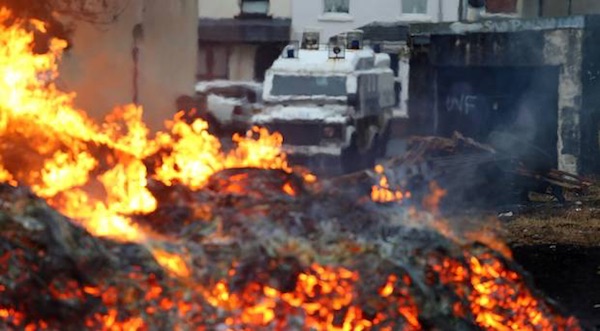
A meeting which took place between the DUP and the unionist paramilitary UVF in the early hours of Wednesday failed to convince the loyalist armed group to lower a giant bonfire, it has emerged.
Bonfires were lit at over 100 sites to mark a medieval Protestant battle victory over Catholics, causing 327 emergency calls, a 23 per cent increase on incidents attended last year.
There were several disturbances in east Belfast and its hinterland after the PSNI moved to reduce the height of a towering pyre at Bloomfield Walkway, following a court order.
Lee Reynolds, the DUP group leader on Belfast City Council, was present at a meeting to deal with the issue, as was Stephen Matthews, widely believed to be the leader of the east Belfast UVF. In the end, leading loyalists present rejected the compromise. As the PSNI moved in on Tuesday night, the loyalist partially ignited their bonfire a night early.
The PSNI subsequently turned instead to remove another toxic and hazardous bonfire in Cluan Place nearby.
As tensions rose over that operation, the UVF carried out a bomb attack on the nationalist Short Strand. A device which exploded in the Clandeboye area after being thrown over a wall at the interface narrowly avoided striking two young children.
The UVF then orchestrated a rash of hijackings and erected burning barriers. Thirteen vehicles were hijacked and burned as masked and armed loyalists took to the streets across a wide area. Roads were blocked and bombs planted. A pipe bomb was left close to Garnerville PSNI station while another was left close to a local primary school.
The alerts led to the shutdown of Belfast’s main Sydenham Bypass. It also forced Belfast City Airport into an hour long lockdown with visitors and commuters alike advised they could not leave the building. Some were left stuck on parked planes.
The PSNI said “concerns remain” about further UVF violence. PSNI assistant chief Alan Todd also dismissed a peace statement issued by the group in April.
“There is absolutely a gap between our intelligence and the statement they made earlier this year,” he said. “I don’t want to be accused of lacking clarity on that. What is playing out at the moment is at odds with that statement.”
Meanwhile, there have been calls for action over hate crimes at those bonfires which targeted victims of the conflict and nationalist groups.
Sinn Fein condemned a banner at a bonfire on Belfast’s Highfield Estate which read “F*** your Ballymurphy Massacre Inquiry”.
Ten people, including a Catholic priest and a mother-of-eight, died during a three-day killing spree by members of the British Army’s Parachute Regiment in August 1971. Another man died of a heart attack following an violent confrontation with the troops in the west Belfast estate. An inquest into the killings is set to begin later this year.
Other banners K.A.T which stands for “Kill All Taigs”, and another which said A.T.A.T ‘All Taigs Are Targets’. Electoral posters also featured on the bonfire.
Sinn Fein MP Paul Maskey had called on the PSNI and unionists to have the offensive banners, posters and flags removed, but with no effect.
“I have reported the display of the banner on the Highfield bonfire, which reads ‘F*** your Ballymurphy Massacre Inquiry’ and Kill all Taigs’, as a hate crime to the PSNI,” he said.
“This is deeply offensive and hurtful to the families of the victims of the Ballymurphy Massacre who have had to wait almost half a century for answers about the killing of their loved ones by the British army in August 1971.”
![[Irish Republican News]](https://republican-news.org/graphics/title_gifs/rn.gif)
![[Irish Republican News]](https://republican-news.org/graphics/title_gifs/harp.gif)

